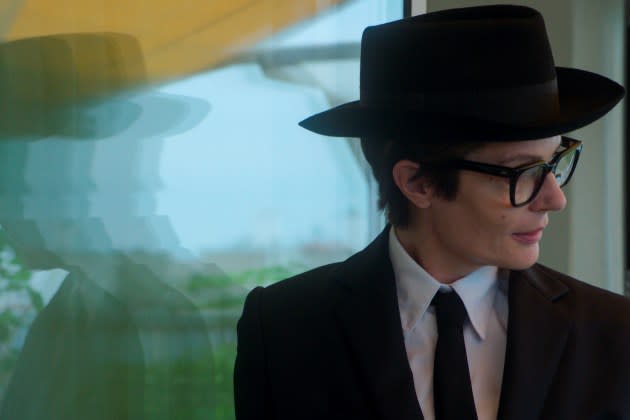‘Marcello Mio’ Review: Chiara Mastroianni Has a Nepo-Baby Identity Crisis In a Toe-Curling Showbiz Meta-Comedy

Celebrities: they’re not just like us, exactly, but they’re human just the same. Which is why some of the current discourse around “nepo babies” must be a little wounding for showbiz scions nursing their own insecurities about their talent, their reputation and their place in the world — even if the prudent thing to do, from a PR perspective, is to openly check your privilege and move on. Yet whatever degree of sympathy one might feel for actor Chiara Mastroianni — the daughter of Catherine Deneuve and Marcello Mastroianni, a dazzling legacy to bear but perhaps not an easy one — largely evaporates by the end of “Marcello Mio,” a vastly indulgent but gossamer-weight bit of frippery from French writer-director Christophe Honoré, in which Mastroianni channels her late father to increasingly contrived comic effect.
So wink-wink it can barely see straight, so inside-baseball it’s practically buried under the pitcher’s mound, the film is built on the kind of hyper-meta conceit that could be cute as a skit, might just stretch to a short, but can’t survive a full two-hour feature padded with subplots that range from the gruesomely twee to the merely nonsensical. A curiously flimsy selection for Competition at Cannes — a Special Screenings slot might have engendered more goodwill while bringing the same star wattage to the red carpet — “Marcello Mio” will find its most receptive audience on home turf, where the film’s surfeit of in-jokes regarding Mastroianni’s real-life connections to other cast members (including ex-husband Benjamin Biolay and close friend Melvil Poupaud) will mean rather more to audiences than they will to those abroad.
More from Variety
“Play it more Mastroianni than Deneuve,” says director Nicole Garcia (played, sure enough, by Nicole Garcia) to our heroine during a halting, awkward audition for her latest film opposite veteran actor Fabrice Luchini (played, sure enough, by — well, you get the idea). “Personally, I was aiming for Chiara,” the actor replies with the kind of edge in her voice that you might well acquire from a lifetime of comparisons to your more celebrated parents. After all, there was only one Marcello Mastroianni, just as there is only one Catherine Deneuve, and no other actor would get this particular note from a director, so why would she take it particularly well? And yet we sort of know what Garcia means: The elder Mastroianni’s onscreen presence was so airy, so sexy, so wryly confident thereof, and so innately Italian that it might seem a rarer and more precious commodity in this extremely French industry milieu.
Either way, Chiara (first-name terms seem less confusing at this point) can’t quite let the director’s throwaway comment go. Born, raised and still based in France, and with no first-hand memory of her parents being together, she has always felt less identified with her father than with her mother; thirty years after his death, she feels, it’s time to redress the balance. She won’t just “play it more Mastroianni,” then — she’ll become him outright. Donning a short dark wig, a black fedora and heavy-rimmed glasses, Chiara slips easily into the iconography of her father in the era of Fellini’s “8?,” while adding a natty stick-on mustache makes her a reasonable if somewhat androgynous ringer for him in “Divorce Italian Style.”
The drag act is successful enough to embolden her further, as she fully subsumes her identity into his. Befriending Colin (Hugh Skinner), a gay, lovelorn English soldier on a midnight mope through Paris, she introduces herself without hesitation as “Marcello Mastroianni,” and so the metamorphosis of sorts is complete. If Colin is bewildered but accepting, her closer friends and family are merely bewildered. Deneuve humors her daughter while fearing she’s having some kind of breakdown, popular singer Biolay does a double-take when she turns up as Marcello to sing a duet with him at one of his concerts, while Poupaud is mortified for his pal, fearing she’s doing herself a disservice in defining herself solely by her lineage.
Garcia is more blunt when “Marcello” turns up to their next reading: “What is this bullshit, Chiara?” she asks, and even at this fairly early stage in the ruse, viewers may find themselves siding with the exasperated director. For Euro-cinema buffs, there is some poignancy in seeing Chiara’s image overlaid with that of her father, and her rueful, vulnerable exchanges with her still-imperious mother carry a bittersweet emotional charge, however fabricated they may be. But Chiara’s journey into Marcello simply isn’t interesting or identifiable enough to carry much dramatic weight, not least when the film mostly plays it for laughs: a climactic journey to Italy, where she intends to unveil the “new” Marcello Mastroianni on a local talk show, devolves into a frantic, farcical chase, with no actual jokes to keep it afloat.
Chiara/Marcello’s burgeoning friendship with Colin — the film’s one fully fictional character, played by Skinner with an understandable air of stiff-upper-lipped befuddlement — is a detour into treacly whimsy that, even given the general twirly randomness of proceedings, corresponds to nothing else in Honoré’s script. Satire, the obvious tonal direction for this kind of insider-y lark, is in strangely short supply throughout, as is the kind of cracked-mirror showbiz surrealism that makes “8?” so enduringly haunting. “Marcello Mio” winds up saying very little about industry power structures, or even about the barbed nature of celebrity. What it does say, it says in complete earnest: that Chiara Mastroianni, whether as herself or her father, is fabulous enough to merit this kind of gauzy, starry-eyed valentine. Maybe so, though if she made the effort to play it more Mastroianni, couldn’t Honoré have played it a little more Fellini?
Best of Variety
Sign up for Variety’s Newsletter. For the latest news, follow us on Facebook, Twitter, and Instagram.